Exploring Acupuncture: A Natural Approach to Combat Insomnia
Sleep disorders are becoming more frequent in today's fast-paced environment, impacting millions of people globally. If you have tried over-the-counter drugs or lifestyle modifications to enhance your sleep but have had little success, you may be looking for an alternate solution. Acupuncture for insomnia is one solution that has grown in favour due to its ability to restore sleep equilibrium naturally.
The Ancient Practice of Acupuncture and Its Modern Relevance
Acupuncture, a time-honoured Chinese medical technique, entails the delicate insertion of thin needles into precise points on the body. These points, referred to as acupuncture points or acupoints, are thought to be interconnected pathways that facilitate the flow of vital energy, known as Qi. Through the stimulation of specific acupoints, acupuncture seeks to rebalance the flow of Qi and enhance one's overall well-being.
Acupuncture is based on Traditional Chinese Medicine (TCM), which sees health as a state of balance within the body. This ancient practice has a history of over 2,500 years and has gained widespread recognition as a highly regarded treatment method worldwide. While abstract, the concept of Qi holds excellent significance in acupuncture. Qi is the vital energy circulating through the body's meridians. When this flow is interrupted, it can lead to various health issues, such as sleeplessness.
Contemporary research provides strong evidence for the effectiveness of acupuncture, demonstrating its ability to activate the body's innate healing mechanisms. Through activating specific points, acupuncture can improve blood circulation, invigorate the nervous system, and facilitate the release of neurotransmitters. Understanding the physiological changes during acupuncture is essential for grasping its potential in managing sleep disorders. Research has indicated that acupuncture has positively impacted sleep quality, reducing the time it takes to fall asleep and increasing the overall sleep duration.
How Acupuncture Helps in Treating Insomnia: A Comprehensive Insight
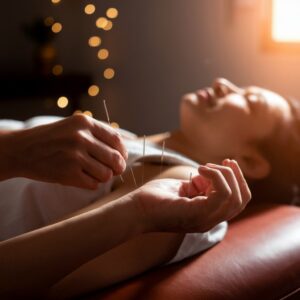 Regulating the Sleep-Wake Cycle Naturally
Regulating the Sleep-Wake Cycle Naturally
By leveraging the skills of an experienced acupuncturist, the sleep-wake cycle can be efficiently regulated through the stimulation of endorphins and other neurotransmitters. This stimulation helps induce a state of deep relaxation and improves the overall quality of sleep. By harnessing the power of acupuncture, you can restore your body's energy flow and achieve a more peaceful and rejuvenating sleep.
The sleep-wake cycle, also known as the circadian rhythm, is a crucial internal process that regulates the natural sleep pattern and wakefulness throughout 24 hours. Disruptions in this cycle can lead to insomnia and other sleep disorders. Acupuncture can impact sleep patterns by focusing on certain points, such as Shenmen (HT7), Sanyinjiao (SP6), and Anmian.
Situated on the wrist, Shenmen, also referred to as Heart 7, can calm the mind and alleviate anxiety, which is frequently the root cause of insomnia. Located above the ankle, Sanyinjiao, also called Spleen 6, is thought to help maintain a healthy balance among the liver, spleen, and kidneys, supporting hormonal equilibrium and reducing stress. Situated behind the ear, Anmian is essential for facilitating a peaceful sleep by assisting in falling and staying asleep.
By skilfully targeting specific points, acupuncture promotes the body's natural production of melatonin, an essential hormone for regulating sleep patterns. Having optimal melatonin levels can help regulate the sleep-wake cycle, leading to better sleep quality and a refreshed morning awakening.
Reducing Stress and Anxiety Through Acupuncture
Stress and anxiety frequently cause sleep disruptions. Acupuncture can induce relaxation and relieve stress by activating the parasympathetic nervous system. Crafting a tranquil atmosphere that encourages profound relaxation can aid in achieving a peaceful night's rest.
Like an acupuncture specialist, the parasympathetic nervous system, the “rest and digest” system, conserves energy and promotes relaxation. Acupuncture stimulates specific acupoints to assist in relieving the body's stress response. Specific points on the body, like Yintang, Baihui, and Neiguan, have proven incredibly effective in alleviating anxiety and stress.
Yintang, a frequently utilised acupuncture point, is renowned for its capacity to alleviate stress and improve mental clarity. Baihui, also called GV20, is well-known for its ability to promote relaxation and balance in both the mind and body. Neiguan, also referred to as Pericardium 6, is frequently used to address symptoms such as anxiety, palpitations, and emotional distress.
By targeting these specific points, the body can release endorphins and serotonin, neurotransmitters that improve mood and promote relaxation. This neurochemical response helps decrease the heightened state often associated with insomnia, making it easier to achieve restful sleep.
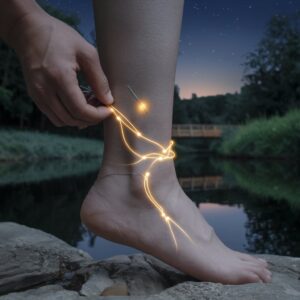 Hormonal Balance: Acupuncture's Role in Regulating Sleep Hormones
Hormonal Balance: Acupuncture's Role in Regulating Sleep Hormones
Hormonal imbalances can cause disrupted sleep patterns. Acupuncture has proven highly effective in targeting specific acupoints closely associated with hormonal regulation, particularly the hypothalamus-pituitary-adrenal (HPA) axis. Thanks to its expertise in rebalancing hormonal systems, acupuncture is highly effective in addressing hormonal disturbances that can cause insomnia.
The HPA axis is a complex system that involves intricate interactions among the hypothalamus, pituitary, and adrenal glands. It significantly impacts stress responses and circadian rhythms. Acupuncture can affect the HPA axis by focusing on certain acupoints, such as Zusanli (ST36), Taixi (KID3), and Guanyuan (CV4).
Situated below the knee, Zusanli, also called Stomach 36, is highly regarded for its ability to boost the immune system and relieve stress. Located on the inner ankle, Taixi, called Kidney 3, is often used to support kidney equilibrium and regulate hormonal cycles. Situated beneath the navel, Guanyuan, also called Conception Vessel 4, is vital in supporting reproductive and hormonal health.
By targeting specific points, acupuncture can regulate cortisol levels, the body's primary stress hormone. Chronic stress can potentially disturb sleep patterns due to elevated cortisol levels. Thanks to its incredible capacity to regulate cortisol and other stress hormones, acupuncture can restore a natural sleep cycle, enhancing both the duration and quality of sleep.
Addressing Underlying Health Issues That Cause Insomnia
Insomnia may indicate underlying health conditions such as chronic pain, digestive disorders, or respiratory issues. By strategically inserting needles, acupuncture can effectively treat underlying conditions by focusing on specific points in the body. Sleep disruptions can be successfully resolved by identifying and tackling the root cause.
A range of chronic conditions can trigger insomnia. With my extensive knowledge and experience, I recognise the difficulties that chronic pain can pose when it comes to finding a suitable sleeping position. In addition, nighttime discomfort can be caused by digestive disorders such as irritable bowel syndrome (IBS), while disrupted sleep can result from respiratory issues like sleep apnea.
By leveraging their knowledge of acupuncture, individuals can effectively relieve chronic pain by targeting key points such as Ashis points, which indicate pain, and specific meridian points like Jianjing (GB21) and Hegu (LI4). Focusing on the Tianjin pressure point, located on the shoulders, can provide effective relief for tension headaches and neck pain. Situated on the hand, Hegu is used to relieve pain and decrease inflammation.
Acupuncture points commonly utilised for digestive disorders are Zhongwan (CV12) and Tianshu (ST25). Situated on the upper abdomen, Zhongwan plays a crucial role in maintaining proper stomach function and alleviating symptoms of indigestion. Tianshu is located near the navel and can assist in maintaining regular bowel movements and alleviating abdominal discomfort.
By addressing these underlying health concerns, acupuncture effectively relieves symptoms and enhances overall well-being, improving sleep quality.
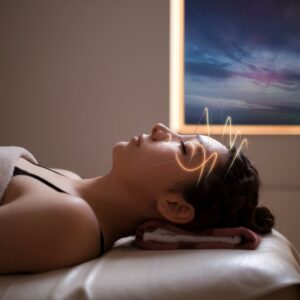 Enhancing Sleep Quality: How Acupuncture Promotes Deep, Restorative Sleep
Enhancing Sleep Quality: How Acupuncture Promotes Deep, Restorative Sleep
Acupuncture can improve both the initiation and overall quality of sleep. Studies have shown that acupuncture may positively impact the production of melatonin, a hormone that plays a crucial role in regulating sleep patterns. Experience more rejuvenating and restful sleep. Discover the stimulating benefits of starting your day with renewed energy and vitality.
Deep or slow-wave sleep (SWS) is crucial for revitalising the body and mind. During this phase, the body undergoes tissue repair, boosts the immune system, and consolidates memory. Acupuncture can enhance sleep quality by focusing on specific points, promoting melatonin production, and assisting the body's innate sleep mechanisms.
Specific acupuncture points, like Yin Tang, Si Shen Cong, and An Mian, have proven incredibly effective in improving sleep quality. Situated between the eyebrows, Yin Tang is well-known for its calming effects. One can enhance cognitive function and reduce mental fatigue by incorporating Si Shen Cong, a technique involving four specific points near the top of the head. It is essential to grasp the significance of An Mian in relation to sleep patterns.
Research has indicated that regular acupuncture sessions can benefit various aspects of sleep, including reducing the time it takes to fall asleep, increasing sleep duration, and improving overall sleep quality. These advantages stem from how acupuncture aids in regulating the autonomic nervous system, reducing hyperarousal, and promoting the body's innate sleep-wake cycle.
Frequently Asked Questions
Is acupuncture painful?
Acupuncture is generally a pleasant and easily manageable experience. The needles utilised are slender, leading to minimal discomfort. People commonly describe the feeling as a subtle tingling or a slight pain.
How many acupuncture sessions are required for treating insomnia?
The number of acupuncture sessions required may vary depending on the severity of insomnia, overall health, and individual response. Usually, a course of treatment involves weekly sessions for several weeks, followed by occasional maintenance sessions as needed.
Are there any side effects of acupuncture for insomnia?
When performed by an experienced practitioner, acupuncture is widely considered a safe treatment option. Occasionally, individuals may experience mild side effects, such as temporary soreness or bruising at the needle insertion site. Choosing a licensed acupuncturist guarantees a safe and effective treatment.
Can acupuncture be used alongside other sleep-promoting methods?
Indeed, acupuncture can significantly enhance efforts to improve sleep quality. It complements other effective methods such as relaxation techniques, sleep hygiene practices, and making positive lifestyle adjustments. Incorporating acupuncture alongside these methods can improve the overall effectiveness, increasing the chances of restoring a healthy sleep pattern.
Is acupuncture suitable for everyone with insomnia?
Acupuncture is widely regarded as a safe treatment option for individuals, including those who experience difficulties with insomnia. However, it may not be suitable for individuals with specific medical conditions, such as bleeding disorders or compromised immune systems. It is essential to consult with a seasoned acupuncturist who can assess your situation and provide personalised advice.
Brought To You By:
Sources:
1. Mayo Clinic. (2021). Acupuncture. Retrieved from https://www.mayoclinic.org/tests-procedures/acupuncture/about/pac-20392763
2. Spence, D. W., Kayumov, L., Chen, A., Lowe, A., Jain, U., Katzman, M. A., … & Shapiro, C. M. (2004). Acupuncture increases nocturnal melatonin secretion and reduces insomnia and anxiety: a preliminary report. The Journal of Neuropsychiatry and Clinical Neurosciences, 16(1), 19-28. doi:10.1176/appi.neuropsych.16.1.19
3. Shergis, J. L., Ni, X., Jackson, M. L., Zhang, A. L., Li, Y., & Guo, X. (2016). A systematic review of acupuncture for sleep quality in people with insomnia. Complementary Therapies in Medicine, 26, 11-20. doi:10.1016/j.ctim.2016.02.004

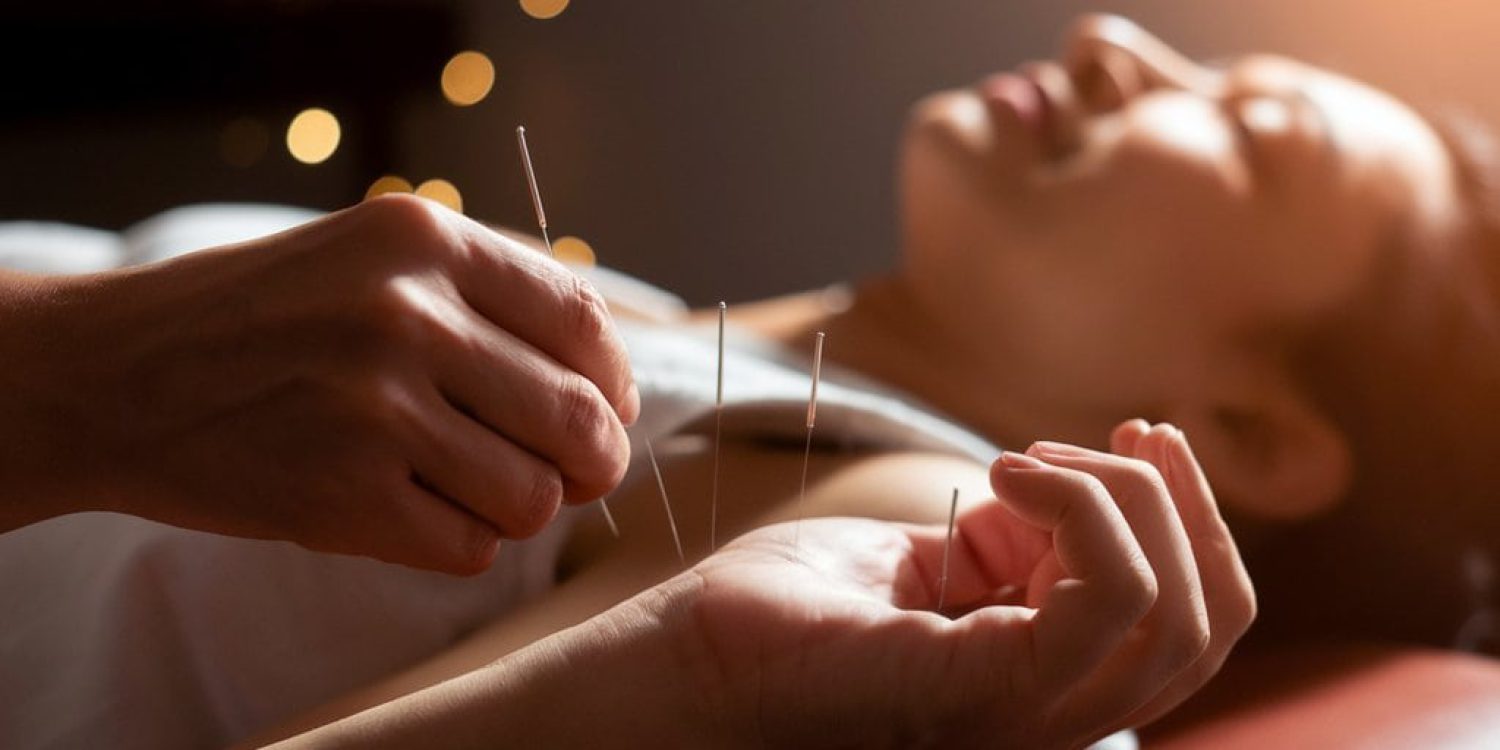


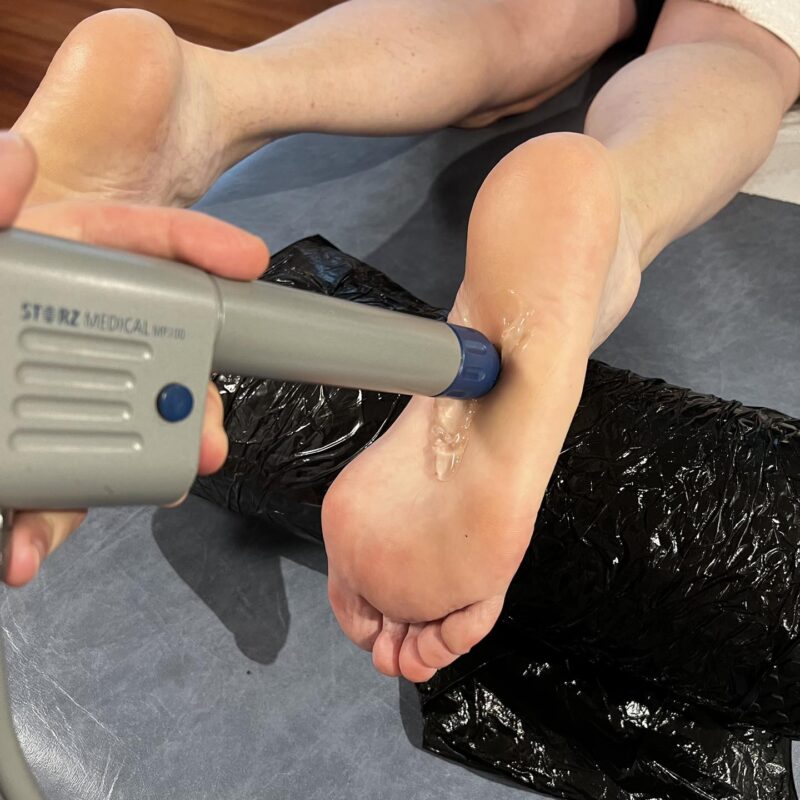












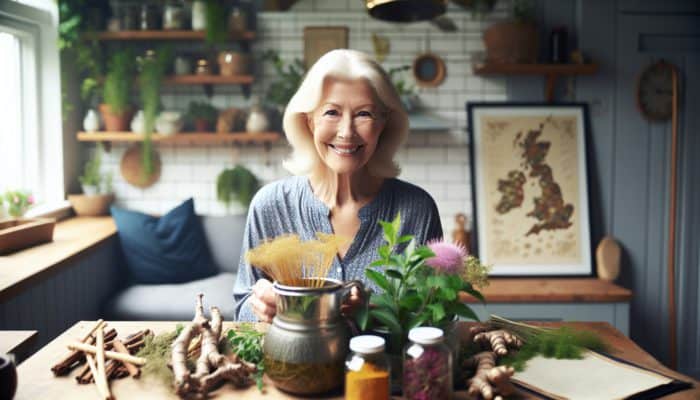

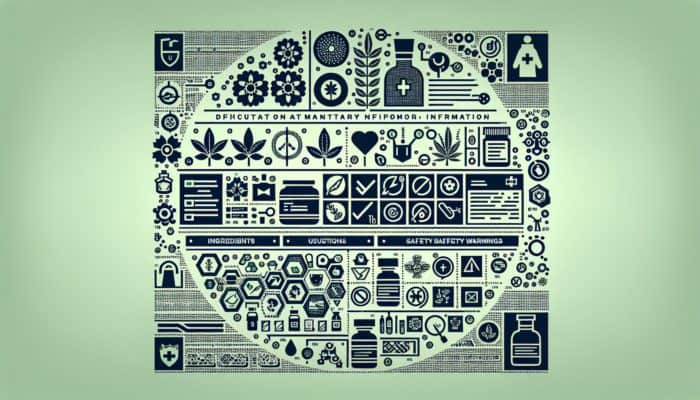



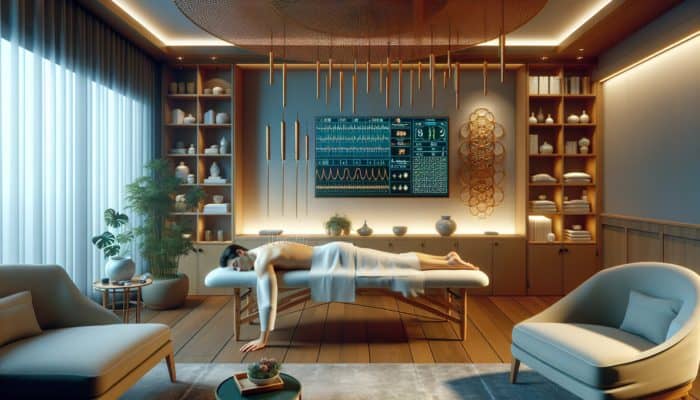


208 Comments
This article provides an excellent and comprehensive overview of how acupuncture can be a highly effective treatment for insomnia, especially in today’s world, where sleep disorders are increasingly common. I appreciate how it breaks down the connection between acupuncture and regulating crucial sleep hormones like melatonin and its impact on the HPA axis to balance cortisol levels. It’s fascinating to learn how specific acupoints like Shenmen, An Mian, and Sanyinjiao can target the root causes of insomnia, such as stress and hormonal imbalances, without the need for medication. The fact that acupuncture can help people fall asleep faster and improve the quality and duration of sleep is a major takeaway. This holistic approach, which addresses both physiological and psychological aspects of sleep disorders, makes acupuncture an appealing alternative for those looking to restore their sleep patterns naturally. Well done MCR Therapies for bringing this information to us, the world’s insomniacs.
It’s great to hear your thoughts on the article. Acupuncture’s role in addressing insomnia really is intriguing, especially with how it connects both body and mind. The emphasis on points like Shenmen and Sanyinjiao strikes me as particularly compelling, considering how personalized treatments can often lead to more effective outcomes.
I find that connection between body and mind, especially in practices like acupuncture, to be really profound. It’s interesting to think about how certain acupuncture points, like Shenmen and Sanyinjiao, can have such a significant impact on not just physical symptoms but also on emotional well-being. The personalization aspect is key here—it reminds me of how different wellness practices can be tailored to individual needs.
I completely resonate with what you’re saying about the connection between body and mind in practices like acupuncture. It’s fascinating how ancient traditions like this have so much to offer in our modern context, especially as we navigate increasingly complex lives where mental and physical stressors are intertwined.
You’ve hit on something really important. The interplay between our bodies and minds isn’t just an abstract concept; it’s a lived reality. Ancient practices like acupuncture shine a light on this relationship in ways modern medicine often overlooks.
I really appreciate your perspective on the connection between mind and body, especially in the context of acupuncture. It’s intriguing how these ancient practices can provide insights into our modern struggles. I’ve found that many people are starting to seek holistic approaches to wellness, blending traditional methods like acupuncture with more contemporary therapies, like mindfulness or even yoga.
It’s fascinating how people are weaving ancient wisdom into their modern lives, isn’t it? I mean, if a good needle prick can help you chill out more than a weekend Netflix binge, maybe we need to rethink our ways of dealing with stress. Acupuncture, when you really think about it, is like the ultimate body hack—sort of like yoga, but with fewer downward dogs and more spectacular stories about trying not to twitch while someone’s sticking you with sharp things.
“Unlock the secrets of the universe—or at least find a really good cat meme—by clicking here!”
https://mcrtherapies.co.uk/ezi
It really is intriguing how we’re finding ways to integrate ancient practices into our hectic modern lives. The idea that something as seemingly simple as acupuncture can provide a deeper sense of relaxation than our usual weekend rituals does prompt a lot of reflection on what we value for our well-being. I’ve tried acupuncture a couple of times, and I have to say, the experience was definitely different from my usual methods of stress relief—it’s almost meditative in a way, where you’re forced to slow down and just… be.
It’s fascinating, isn’t it? The contrast between our fast-paced routines and the age-old wisdom of practices like acupuncture really does make one stop and think about what we genuinely seek for our well-being. It’s not just about finding a quick fix for stress anymore; it’s about cultivating a lifestyle that prioritizes mental and physical health.
“I’m glad to hear you’ve had such a thoughtful experience with acupuncture! If you’re interested in exploring more about how ancient practices can enhance your well-being, check out this link for some valuable insights and resources.”
https://mcrtherapies.co.uk/yt
You bring up an interesting point about blending ancient practices like acupuncture into our modern lives. There’s definitely a growing recognition that ancient wisdom can provide effective solutions to today’s stressors. It’s almost poetic how a practice that has been around for thousands of years continues to resonate, isn’t it?
It’s interesting that you mention the blending of traditional methods with contemporary therapies. I’ve found that this fusion often leads to a more comprehensive approach to wellness. For instance, I’ve been practicing yoga for a while now, and it really complements the acupuncture sessions I’ve had. The two together create a more profound sense of balance and awareness in my body.
I find it fascinating how much can come from blending traditional methods with contemporary therapies. Your experience with yoga and acupuncture really highlights how different practices can work together to enhance our well-being. I’ve dabbled in similar approaches; for instance, after starting meditation alongside my workouts, I’ve noticed a significant improvement in my focus and recovery.
It’s interesting how integrating practices like meditation into your routine can lead to such noticeable changes. I’ve experienced something similar with yoga and acupuncture. It’s fascinating to see how traditional methods can complement more contemporary approaches, creating a well-rounded path to wellness.
It’s great to hear about your experiences with yoga and acupuncture. There’s something powerful in how these time-honored practices intersect with modern lifestyles. People often overlook the organic synergy between various wellness approaches. For instance, meditation can serve as a mental foundation, making it easier to engage fully in yoga, while acupuncture can help with physical ailments, enhancing the overall experience. Have you found particular combinations that resonate best with you? The feedback loop between these practices seems to amplify their benefits, creating a richer path to well-being for many.
I completely agree with you about the interconnectedness of these practices. It’s fascinating how they each bring something unique to the table yet enhance one another so beautifully. For me, I’ve found that integrating meditation before my yoga sessions really transforms the experience. It helps me center my thoughts and focus on my breath, which allows me to be more present in my movements.
I recently came across a resource that dives into finding quality acupuncture in our area, which really complements those discussions about merging ancient practices with modern wellness.
‘Good Acupuncture Near Me: Elswick, Preston’
https://mcrtherapies.co.uk/good-acupuncture-near-me-elswick-preston/.
You make a really interesting point about the synergy between various wellness practices. I’ve definitely noticed that when I incorporate meditation into my routine before yoga, it helps me to connect more deeply with my body and intentions during the flow. It almost feels like I’m setting the stage for a more meaningful session.
It’s great to hear about your experiences with yoga and acupuncture. There’s something truly powerful about how these practices can enhance each other. Yoga serves not just as a physical practice but also as a way to connect more deeply with ourselves. It’s interesting how the mindfulness and breathwork involved in yoga can set the stage for the deeper, often more subtle shifts that occur during acupuncture.
I’m glad to hear you’re experiencing such positive results! If you’re interested in exploring more about the synergy between traditional and contemporary practices, check out this resource that dives deeper into how they can enhance your wellness journey.
https://mcrtherapies.co.uk/fb
It’s fascinating to hear about your experience with yoga and acupuncture—those two really do seem to create a harmonious balance for many people. I’ve dabbled in both as well, and I’ve noticed how each practice enriches the other. Yoga has this way of bringing awareness to areas that might feel tight or out of sync, and then acupuncture seems to enhance that by addressing energy flow and physical blockages.
I completely resonate with what you’re saying about yoga and acupuncture. There’s something so profound in the way these practices intertwine, almost like a dance where each one enhances the other. I remember my early days of practicing yoga; I found myself becoming more aware of the physical sensations in my body that I hadn’t paid much attention to before. Each stretch and pose seemed to unveil areas where I carried tension, almost like uncovering hidden layers of my own self.
“I’m glad to hear you’ve experienced that synergy! If you’re looking to deepen your practice even further, check out this resource that explores how yoga and acupuncture can work together beautifully.”
https://mcrtherapies.co.uk/yt
It’s great to hear about your experience blending yoga with acupuncture. It’s fascinating how these practices can enhance each other. Yoga’s focus on breath and movement really creates a space for awareness and connection to the body, while acupuncture can address specific physical and energetic blockages.
I completely resonate with your thoughts on the mind-body connection, especially as it pertains to acupuncture. It really is fascinating to see how these ancient practices find relevance in our modern lives. I think it speaks volumes about the universal need for holistic approaches in a world that often leans heavily on quick fixes.
I came across an article that dives into local acupuncture options in Preston, and it really highlights how these practices can complement modern wellness trends like mindfulness and yoga.
‘Good Acupuncture Near Me: Longridge, Preston’
https://mcrtherapies.co.uk/good-acupuncture-near-me-longridge-preston/.
It’s interesting how the mind-body connection has been gaining more recognition in recent years, isn’t it? I feel like there’s a growing collective awareness about the importance of holistic approaches to health, especially when so many of us find ourselves caught up in the fast pace of modern life. Acupuncture, with its rich history, serves as a beautiful reminder of how we can blend ancient wisdom with contemporary wellness practices.
I couldn’t agree more with your perspective on the mind-body connection, especially in how acupuncture taps into that. It’s interesting how these ancient techniques have found their place alongside modern practices like mindfulness and yoga. There’s something really comforting about combining the wisdom of the past with our current understanding of health and wellness.
I really appreciate your thoughts on the mind-body connection and how ancient practices like acupuncture have made their way into today’s wellness routines, alongside mindfulness and yoga. It really is fascinating to think about how these time-tested techniques continue to resonate with us. They offer a holistic approach that can feel quite grounding, especially in a fast-paced world where we often find ourselves pulled in many directions.
It’s refreshing to hear your thoughts on the mind-body connection, especially in relation to acupuncture. That interplay between ancient wisdom and modern techniques like mindfulness and yoga brings a unique richness to our understanding of health. When we step back and consider how these traditions have survived and evolved, it really highlights a fundamental need for balance in our lives—something that’s increasingly important in today’s fast-paced world.
I appreciate your perspective on the mind-body connection, especially through the lens of acupuncture. It really does highlight how ancient practices can provide valuable insights into our modern wellness journeys. There’s something refreshing about embracing these holistic approaches, especially when you consider how prevalent quick fixes seem to be in today’s fast-paced world.
You’re spot on about the mind-body connection and acupuncture. It’s like the original Wi-Fi for wellness—tapping into energy that’s been around longer than your grandma’s casserole recipe!
You’re spot on about the beauty of blending ancient practices with our current wellness journeys. It’s wild how so many of us are searching for quick fixes, yet those quick solutions often overlook the deeper connections we have with our bodies. Acupuncture, for instance, is all about balance and listening to what our body really needs, rather than just treating symptoms on the surface. It feels like a reminder to slow down and recharge, doesn’t it?
“Absolutely! Embracing holistic practices like acupuncture can truly transform our wellness journeys. If you’re interested in exploring these ancient techniques further, check out this [resource](#) that delves deeper into their benefits.”
https://mcrtherapies.co.uk/ezi
It’s great to hear that you connect with the mind-body idea so strongly. Acupuncture really does bridge that gap between traditional wisdom and today’s wellness trends. It’s like a reminder that sometimes, slowing down and addressing our holistic well-being is the way to go in a fast-paced world.
I’m glad to hear that you resonate with the mind-body connection! If you’re interested in exploring local acupuncture options that beautifully align with holistic practices like mindfulness and yoga, check out this resource on great places in Preston: [Good Acupuncture Near Me: Longridge, Preston](https://mcrtherapies.co.uk/good-acupuncture-near-me-longridge-preston/). It’s a fantastic way to enhance your wellness journey!
https://mcrtherapies.co.uk/ezi
I really appreciate your perspective on the mind-body connection. It’s fascinating how practices like acupuncture have integrated many ancient philosophies into modern wellness routines. I think in our busy lives, it’s easy to forget the importance of tuning into our bodies and fostering that connection.
It’s great to hear you found the discussion on the mind-body connection resonant. You’re right; in the hustle and bustle of daily life, it’s so easy to disconnect from what our bodies are trying to communicate. Acupuncture, like many ancient practices, serves as a reminder of how intertwined our physical and mental states really are.
I completely agree with you about the mind-body connection. It feels so vital, especially in our ever-accelerating lives. Acupuncture offers a unique perspective in that it not only focuses on physical ailments but also emphasizes emotional balance and overall well-being.
I appreciate your insights on the mind-body connection and how acupuncture fits into that picture. It’s true that in our fast-paced world, we often overlook the benefits of more traditional, holistic methods in favor of quick solutions. It seems like the more technology evolves, the more people crave a return to these grounding practices.
I completely get what you’re saying about the connection between mind and body, especially with acupuncture. It’s fascinating how these ancient practices have stood the test of time and are resonating with so many today. I think the growing interest in holistic approaches really reflects a collective yearning for balance in a world that often feels chaotic.
You raise a great point about how these ancient practices resonate today. The rise of holistic approaches seems to echo a fundamental need many people have. Acupuncture, for example, isn’t just about pain relief; it’s about fostering a deeper connection to our own bodies and recognizing the ways our emotions can manifest physically.
It’s really heartening to see a conversation like this unfold. You’ve touched on something profound about the connection between mind and body, and how ancient practices like acupuncture have carved a space for themselves in our modern world. It’s almost like these methods have weathered the storms of time, proving their worth over centuries.
“Embark on a transformative journey that empowers you to unlock your true potential and embrace a brighter future—discover the possibilities that await you by exploring the link below.”
https://mcrtherapies.co.uk/fb
I really resonate with what you’re saying about the connection between mind and body, especially in the context of acupuncture. It’s remarkable how these ancient practices not only have enduring relevance but also continue to evolve and integrate into modern wellness paradigms. I’ve personally found that exploring holistic approaches can really enhance both mental and physical well-being.
You’re spot on about the growing interest in holistic approaches to wellness. It’s fascinating to see how people are blending ancient practices like acupuncture with modern therapies such as mindfulness and yoga. These combinations can create a more rounded approach to health, tapping into both the body and the mind.
It’s fascinating how people are weaving together these ancient practices with the modern wellness toolkit. I mean, who would’ve thought that sticking needles in yourself could make you feel like you just floated out of a yoga class? It’s like that ancient wisdom got an upgrade, a bit like adding Wi-Fi to your coffee maker—unexpectedly life-changing.
“Click here for a giggle that even your coffee can’t handle!”
https://mcrtherapies.co.uk/yt
It’s cool to hear your thoughts on the mind-body connection in relation to acupuncture. It’s fascinating how these traditional practices have stood the test of time and still find relevance in the bustling modern world. The blend of acupuncture with contemporary methods like mindfulness and yoga really seems to resonate with a lot of people today.
“Check this out – it’s definitely worth your time!”
https://mcrtherapies.co.uk/ig
It’s fascinating how we’re starting to blend these ancient practices with modern wellness strategies. Acupuncture has such a rich history, and it really does offer a unique perspective on how energy flows through our bodies. When combined with mindfulness or yoga, it can create a more holistic view of health that many people find beneficial.
“I’m glad you found the connection intriguing! If you’re curious about how to incorporate these holistic approaches into your wellness routine, check out this resource that blends traditional practices with modern techniques.”
https://mcrtherapies.co.uk/yt
Your insights really hit home. It’s interesting to see how ancient practices like acupuncture provide us with tools that can seem almost timeless in their relevance. In a world where we’re bombarded with the demands of daily life—work, relationships, even just staying connected—it’s easy to forget how our physical state profoundly influences our mental well-being.
“Discover insights that could transform your perspective—click here to explore!”
https://mcrtherapies.co.uk/fb
It’s really interesting how these ancient practices, like acupuncture, still find relevance in our day-to-day lives. When you think about it, our ancestors developed these methods out of pure necessity, tuning into the body’s signals in ways that modern medicine is just starting to appreciate. In a world where we often focus solely on physical symptoms, acupuncture reminds us that our mental and emotional states are equally important in the healing process.
I completely agree with you about the profound connection between body and mind, especially in practices like acupuncture. It’s intriguing how these ancient traditions still resonate today, offering insights that often feel more relevant than ever. Living in a fast-paced world, it’s easy to forget how much our mental and physical states influence each other.
I really resonate with what you said about the body-mind connection. It’s fascinating how something like acupuncture, which has been practiced for thousands of years, still holds so much significance in our modern lives. I’ve personally found that engaging in practices like yoga or meditation helps me tune into that connection, especially on days when stress runs high.
It’s great to hear your perspective on this. The connection between body and mind often gets overlooked in our daily chaos. With everything pulling at our attention, from work deadlines to constant notifications, we can easily forget to tune into what our bodies are telling us.
I’m glad you resonate with those insights! If you’re interested in exploring more about the mind-body connection and how practices like acupuncture can benefit you, check out this resource I found.
https://mcrtherapies.co.uk/ig
I find that connection between body and mind truly fascinating, too. Acupuncture, in particular, highlights how these ancient practices aren’t just relics of the past but can provide a framework for understanding modern health challenges.
I’ve always found the interplay between body and mind fascinating, too. Acupuncture highlights this connection beautifully, as it taps into our energy pathways in such a direct manner. When I first learned about points like Shenmen and Sanyinjiao, I was surprised by how much they could influence not just physical conditions but emotional states as well. It’s like each point holds a little story of its own, echoing the idea that we’re not just treating symptoms but engaging with the whole person.
It’s refreshing to see someone appreciate the depth of acupuncture. The way it intertwines physical and emotional health truly is remarkable. When you dive into points like Shenmen and Sanyinjiao, it’s like peeling back the layers of a complex narrative within our own bodies. Shenmen, known for its calming effects, can help to quiet racing thoughts; while Sanyinjiao is often linked to reproductive health but also affects emotional balance and wellness.
I completely resonate with your perspective on acupuncture. There is something almost poetic about how it connects physical sensations with emotional states. When I first started exploring acupuncture, I was struck by how certain points like Shenmen seemed to act like a gateway, allowing me to access deep-seated thoughts and feelings I didn’t even realize were there.
The connection between the body and mind in acupuncture really does open up intriguing avenues for exploration. It’s interesting how points like Shenmen and Sanyinjiao can lead to profound shifts in both physical and emotional states. Acupuncture isn’t just about needles; it’s about understanding how our body’s energy flows and how it interacts with our emotions.
“Discover key insights here.”
https://mcrtherapies.co.uk/ig
I completely resonate with what you’re saying about the body-mind connection; it’s such a rich area to explore. Acupuncture does seem to have a unique way of bridging that gap. When I first experienced it, I was struck by how certain points, like Shenmen, could bring up emotions or memories I didn’t even realize were lingering. It’s intriguing how the physical and emotional are so intertwined, and acupuncture allows us to interact with that in a tangible way.
It’s fascinating to hear your experience with acupuncture, especially how certain points like Shenmen can unearth hidden emotions. This points to how intertwined our physical and emotional selves truly are. It’s as if our bodies store memories, and acupuncture can be a key to unlocking them.
“I’m glad to hear you resonate with that! If you’re interested in diving deeper into the body-mind connection through acupuncture, I invite you to check out this resource that explores its benefits further.”
https://mcrtherapies.co.uk/yt
I completely agree with you; the connection between our physical and emotional selves is quite profound. It’s interesting how certain points like Shenmen can bring up feelings we might not even be consciously aware of. I’ve found that experience not just revealing but also somewhat therapeutic. It makes me think about how various cultures view emotional health—like in Traditional Chinese Medicine, emotions are often linked to different organs.
Since you’re exploring the body-mind connection, you might find it intriguing how acupuncture can also help with insomnia by addressing not just the symptoms but the underlying emotional factors too.
‘Acupuncture for Insomnia’
https://mcrtherapies.co.uk/services/acupuncture-for-insomnia/.
You bring up a great point about the connection between our physical and emotional selves—it’s truly fascinating how these elements intertwine. I’ve personally experienced moments during acupuncture where specific points triggered a rush of emotions I didn’t realize were there. It’s like unearthing hidden layers within ourselves, isn’t it?
I recently came across some insights on finding good acupuncture in the Longridge area, and it seemed to resonate with the body-mind connection you mentioned—especially how the right practitioner can support emotional well-being along with physical health.
‘Good Acupuncture Near Me: Longridge, Preston’
https://mcrtherapies.co.uk/good-acupuncture-near-me-longridge-preston/.
You captured the essence of acupuncture beautifully, especially that unexpected surge of emotions. It’s striking how our bodies can hold onto feelings, often just beneath the surface, waiting for the right trigger. Your experience speaks volumes about the importance of finding a skilled practitioner who recognizes that dynamic between the physical and emotional.
I really appreciate your perspective on how acupuncture can help access those hidden emotions. It’s intriguing to think about the ways our bodies hold onto memories and experiences, often in ways we might not consciously recognize. The Shenmen point, in particular, is quite remarkable — it seems to act as a bridge between emotional release and physical relaxation.
I completely agree with you about the body-mind connection being such an intriguing area to explore. It’s fascinating how something like acupuncture can serve as a conduit for that connection. I remember my first experience with it too; I was surprised at how some points triggered emotions I thought I’d processed long ago. Shenmen, in particular, feels like it opens a door to deeper layers of consciousness.
It’s interesting how acupuncture can really open up layers within us that we didn’t know were there. Your experience with Shenmen resonates deeply. It often feels like these points are not just physical anchors but emotional beacons, guiding us to places we might have tucked away.
You’ve touched on something really important about acupuncture, the way it navigates the intricate pathways of our bodies and minds. It’s fascinating how points like Shenmen and Sanyinjiao can serve as gateways to both physical and emotional healing. Each point does indeed seem to carry its own narrative, revealing the interconnectedness within us.
“Discover valuable insights and resources that can enhance your journey—click here to explore further.”
https://mcrtherapies.co.uk/fb
It’s intriguing how acupuncture weaves together physical and emotional aspects of our well-being. The way points like Shenmen and Sanyinjiao can act as bridges between our mind and body really speaks to the holistic nature of this practice. I’ve found that exploring specific points often reveals layers of tension or unresolved emotions, leading to surprising insights during treatment.
You’re really hitting the nail on the head with that observation about acupuncture! It’s like a secret two-for-one deal where you’re treating the body and the mind at the same time. And those points like Shenmen and Sanyinjiao—you could almost consider them the VIP lounges of our body’s points, where all the deep chats happen. Who knew that some small nicks and nudges could tap into such a treasure trove of emotions?
“I’m glad to hear your thoughts on this holistic journey! If you’re interested in exploring more about the profound connections between acupuncture points and our emotional well-being, check out this resource.”
https://mcrtherapies.co.uk/fb
It’s fascinating how acupuncture really taps into that interplay between our physical and emotional selves. The way you describe points like Shenmen and Sanyinjiao as bridges resonates deeply with me. I remember my first experience with acupuncture when I had no idea how much emotional tension I was holding. It struck me how these points corresponded not just to physical discomfort but also to deeper layers of stress from my daily life.
It really is intriguing how acupuncture creates that connection between our physical and emotional states. I’ve experienced that disconnect firsthand; sometimes it’s easy to overlook how much we carry in our bodies until something like acupuncture makes us more aware of it. The way you describe points like Shenmen and Sanyinjiao as bridges highlights their role in not just addressing physical ailments, but also in unlocking emotional tension that we might not even realize we’re gripping onto.
It’s really interesting how acupuncture can serve as a kind of gateway to deeper self-awareness. I resonate with your experience of feeling that disconnect between physical and emotional states. I think many of us tend to ignore subtle signals from our bodies until they become hard to ignore. The idea that acupuncture can highlight these connections is something I’ve pondered quite a bit.
You’ve hit the nail on the head about the connection between the physical and emotional aspects of acupuncture. It’s fascinating how points like Shenmen and Sanyinjiao serve as these little gateways to deeper awareness. When we access these points, it really does feel like peeling back layers, doesn’t it? Each session can bring up something unexpected, shedding light on emotions we might not even realize we were holding onto.
“I’m glad you found that connection! If you’re interested in diving deeper into how acupuncture can enhance your emotional and physical well-being, check out more insights and resources here.”
https://mcrtherapies.co.uk/ezi
You’re spot on about the significance of those acupuncture points. It’s interesting to think about how Shenmen and Sanyinjiao, among others, not only provide physiological benefits but also tap into our emotional landscapes. Every point seems like a doorway to different experiences in our bodies, which really emphasizes the holistic approach that acupuncture brings.
I really appreciate your thoughts on the mind-body connection, especially regarding acupuncture. It’s fascinating how certain points can influence both our physical state and emotional health. I remember attending a workshop where they discussed the idea of Shenmen, often called the “Spirit Gate”. Learning how it can help calm the mind and relieve anxiety made me reflect on the powerful intersections between physical sensations and mental states.
It’s great to hear your thoughts on the mind-body connection and the role of acupuncture. The way acupuncture taps into those specific points, like Shenmen, is truly intriguing. Shenmen, or the “Spirit Gate,” is such a compelling concept. I mean, the idea that there’s a literal spot on our body that can help quiet our racing minds and ease anxiety—it’s kind of like having a little reset button right in our ears!
I completely resonate with what you’re saying about Shenmen and its calming effects. It’s fascinating how acupuncture, with its precise points, connects both our physical and emotional states. The idea of the “Spirit Gate” as a reset button is a perfect analogy, especially in today’s world where anxiety seems to be so prevalent.
Your reflections on the mind-body connection and the role of acupuncture, especially regarding points like Shenmen, resonate deeply. It’s intriguing how ancient practices are revealing layers of understanding that seem to align with modern psychological insights. The notion of Shenmen as the “Spirit Gate” is particularly fascinating. It opens the conversation to not just physical healing, but the significant impact on emotional well-being.
It’s interesting to hear your thoughts on the mind-body connection, particularly with your experience at the workshop. The concept of Shenmen as the “Spirit Gate” really resonates with me too. It’s intriguing how just a few points on our bodies can create such profound changes in our mental and emotional well-being.
I completely agree with you about the mind-body connection being such a fascinating area to explore. During the workshop, I found it enlightening to see how something as seemingly simple as acupuncture points can unlock deeper emotional layers and promote healing. Shenmen, in particular, feels almost mystical—like this gateway that opens not just to relaxation but to a greater understanding of ourselves.
It’s great to hear your thoughts on the mind-body connection. You’ve touched on something really intriguing with Shenmen. The idea that tapping into specific points can help us navigate our inner landscapes feels almost like a form of self-discovery. It’s fascinating how a simple touch can evoke deep emotions or memories we might not even realize are there. Have you noticed any changes in your perspective or emotional state since the workshop? It’s amazing how these practices can shift our understanding of ourselves in such subtle yet profound ways.
I’m so glad you found the workshop enlightening! If you’re interested in diving deeper into the mind-body connection and exploring more about acupuncture and its emotional benefits, check out this resource I found—it beautifully expands on these themes.
https://mcrtherapies.co.uk/ig
The connection between our physical and emotional health is something that often gets overlooked in everyday life. You mentioned Shenmen—what an intriguing concept. It really serves as a reminder that our bodies aren’t just vessels; they’re complex systems intertwined with our mental well-being.
You bring up a really important point about the connection between physical and emotional health. It’s so easy to get caught up in our daily routines and forget how interconnected our mental state is with our physical well-being. Shenmen, in particular, fascinates me because it embodies the idea that our mind and body are not just parallel tracks but actually weave into each other.
I recently came across some great insights on acupuncture that resonate with the idea of our physical and emotional health being deeply interconnected, and it really highlights how holistic approaches can support our well-being.
‘Good Acupuncture Near Me: Longridge, Preston’
https://mcrtherapies.co.uk/good-acupuncture-near-me-longridge-preston/.
You’ve touched on such a rich topic. The relationship between physical and emotional health can sometimes feel understated in our fast-paced lives. It’s interesting how practices like acupuncture really highlight that connection. The concept of Shenmen, or “Spirit Gate,” speaks volumes about treating the whole person rather than just symptoms.
You’ve captured something really special about Shenmen and its role in bridging the mind and body. It’s fascinating how practices like acupuncture bring that connection to life. When we think about how our physical discomfort can stem from emotional stress or anxiety, it’s clear that they feed off each other.
You’ve touched on such an important aspect of holistic health. It’s interesting to see how practices like acupuncture can serve as a kind of bridge between our physical and emotional states. I’ve often found that when I deal with stress, it manifests physically in ways I wouldn’t have noticed otherwise—like tight shoulders or digestive issues. It’s almost as if our bodies are trying to tell us something about what we’re feeling inside.
I completely resonate with what you’re saying about the connection between body and mind, especially regarding acupuncture. It’s fascinating how the energy flows through those points like Shenmen and Sanyinjiao can influence both our physical state and emotional landscape. I’ve read studies that suggest acupuncture not only helps manage pain but can also alleviate symptoms of anxiety and depression—it’s that mind-body interplay that really highlights how interconnected we are.
I really appreciate how you articulated the connection between body and mind in the context of acupuncture. It’s intriguing how those specific points like Shenmen and Sanyinjiao not only affect our physical health but also our emotions and mental well-being. I’ve also noticed in my own experience that after an acupuncture session, I often feel a sense of calm and clarity that can linger long after.
I really appreciate how you articulated the connection between body and mind in the context of acupuncture. It’s intriguing how those specific points like Shenmen and Sanyinjiao not only affect our physical health but also our emotions and mental well-being. I’ve also noticed in my own experience that after an acupuncture session, I often feel a sense of calm and clarity that can linger long after.
It’s great to hear that you resonate with the connection between body and mind, particularly in the context of acupuncture. The idea of energy flowing through points like Shenmen and Sanyinjiao really captures a vital aspect of how our bodies work. It’s fascinating to think about how these ancient practices align with modern scientific understandings of health.
It’s such a great point you bring up about the connection between body and mind with acupuncture. Those specific points like Shenmen and Sanyinjiao are fascinating because they highlight how our physical health and emotional states are intertwined. Shenmen, for instance, is often used to calm the spirit and ease anxiety, while Sanyinjiao is linked to hormonal balance and can really help with stress relief. It’s like tapping into a whole system that’s designed to work together.
“Exploring this connection further can be incredibly rewarding! If you’re interested in personalized approaches to wellness, check out this resource that dives deeper into the interplay between acupuncture and emotional balance.”
https://mcrtherapies.co.uk/fb
You raise a valuable point about the connection between body and mind in acupuncture, especially with insomnia. It’s fascinating how certain points like Shenmen and Sanyinjiao not only target specific symptoms but also reflect a deeper understanding of the individual’s state.
“Discover the truth behind the facade.”
https://mcrtherapies.co.uk/fb
It’s intriguing how acupuncture weaves together the physical and psychological aspects of health, especially when it comes to something as complex as insomnia. The points you mentioned, Shenmen and Sanyinjiao, serve as great examples of how traditional practices approach well-being holistically. It makes you think about how our entire being—body and mind—is often interlinked, and how issues like stress or anxiety can manifest in physical symptoms or disrupt sleep patterns.
It’s interesting how acupuncture can bridge the body-mind connection, especially for challenges like insomnia; if you’re curious about effective local options, there’s some insightful information you might find helpful.
‘Good Acupuncture Near Me: Goosnargh, Preston’
https://mcrtherapies.co.uk/good-acupuncture-near-me-goosnargh-preston/.
You’ve hit on something really important when it comes to understanding acupuncture and its role in our overall health. The way insomnia can reflect deeper issues—like stress and anxiety—illustrates the complexity of our well-being. It’s not just about treating one symptom; it’s about recognizing how intertwined our physical and psychological states can be.
You’ve captured an important aspect of acupuncture nicely with your observation about the intricate connection between the body and mind. It’s fascinating how these ancient practices offer insights into how our well-being is not just about treating one symptom but addressing the whole person. The relationship between stress, anxiety, and insomnia really highlights how intertwined our emotional state can be with our physical health.
I completely resonate with your thoughts on acupuncture and the mind-body connection. It’s intriguing how these ancient practices can feel so timely and relevant in our fast-paced, modern lives. The way you highlighted the connection between stress, anxiety, and insomnia really strikes a chord; it’s a reminder that our emotional and physical health are inextricably linked.
I totally agree with you about how ancient practices like acupuncture can feel so relevant today. It’s fascinating to think about how these techniques have endured across centuries, likely because they tap into fundamental aspects of our well-being.
I really appreciate your thoughts on acupuncture and its lasting relevance. It’s interesting to consider how these ancient practices have stood the test of time, especially in our fast-paced, modern world where quick fixes and new technologies often dominate the conversation around health.
You hit the nail on the head with the body-mind connection, especially in the realm of insomnia. It’s like the universe decided to create a tangled ball of yarn with our health—when one string gets tugged, the whole thing starts to unravel. Stress and anxiety sneaking in to mess with our sleep is a classic case of our mental and physical states doing the waltz together. And when it comes to insomnia, well, you might as well be dancing on a bed of nails; it’s uncomfortable and hard to get a good night’s sleep when the worrying thoughts are throwing a rave in your brain.
You’ve captured that body-mind connection beautifully. It’s fascinating how intertwined our mental and physical health really are, isn’t it? When you think about it, there’s a delicate balance—like a seesaw that tips easily when one side is heavily weighed down by stress or anxiety.
You’ve hit the nail on the head with the mind-body connection, especially when it comes to insomnia. It’s like a tangled ball of yarn, with each thread representing the various aspects of our well-being—stress, anxiety, lifestyle choices, and of course, sleep. Acupuncture, with its tiny needles and ancient wisdom, really does offer a unique way to untangle that mess.
I completely agree with you on the intriguing nature of acupuncture for insomnia. It really does highlight the interconnectedness of our physical and mental health. I’ve found that when traditional methods fail, exploring modalities like acupuncture can bring surprising relief. Shenmen and Sanyinjiao are definitely interesting points; they embody how targeted treatment can be tailored to individual needs.
You’ve hit the nail on the head about the mind-body connection, which is one of those delightful revelations that keeps popping up in the world of wellness. It’s like a cosmic game of tag—just when you think you’ve caught one issue, the other sneaks up from behind to give you a little nudge.
“Curious minds click here—your next laugh is just a link away!”
https://mcrtherapies.co.uk/fb
I really appreciate your take on the mind-body connection. It’s fascinating how this relationship continues to unfold in various aspects of wellness, isn’t it? I often find that just when I think I’ve addressed one area—like stress management through meditation, for instance—something else pops up, reminding me that it’s all interconnected.
It’s so true that the mind-body connection unfolds in unexpected ways, isn’t it? Each time we think we’ve addressed one aspect, another layer reveals itself. You’ve nailed how interconnected everything is; it can feel like a game of whack-a-mole sometimes, right?
It really is fascinating how layers of our experience can unveil themselves in such unexpected ways. I often find that just when I think I’ve gotten a handle on one aspect of my well-being, another issue pops up that I hadn’t even realized was tied to it. It’s like peeling an onion, but instead of tears, it feels like there’s always some deeper insight waiting beneath the surface.
I completely resonate with your observation about the mind-body connection. It definitely feels like peeling an onion sometimes—just when you think you’ve tackled one layer, another one emerges. Sometimes it’s surprising how a mental shift can lead to physical changes, or vice versa.
You bring up such a valuable point about the ever-evolving nature of the mind-body connection. It’s as if we’re peeling an onion, layer by layer, only to discover new nuances with each one we remove. Stress management is a perfect example of this intricate web we navigate. When we find something that works—like meditation—it can feel like we’ve unlocked a door. But, just as you’ve experienced, there are always new doors that appear, and navigating those can sometimes feel overwhelming.
“We understand that navigating your journey can be challenging, and we truly want to support you in making informed decisions; explore this insightful resource that could provide the guidance you’re looking for.”
https://mcrtherapies.co.uk/yt
You’ve captured the essence of the mind-body connection so beautifully. It really is like peeling layers—each one revealing something new about ourselves. I find that as we dig deeper, we not only uncover different stressors but also discover unexpected strengths and coping mechanisms.
You’ve captured that mind-body connection perfectly—it really does feel like a playful dance where one aspect influences the other more than we might realize. It’s fascinating how modern wellness practices are beginning to embrace this holistic approach. I’ve been reading about how mindfulness and meditation not only help with mental clarity but also have tangible benefits for our physical health, like reducing stress-related ailments.
I think you’ll find the insights on acupuncture really complement that mind-body connection you mentioned—it’s fascinating how these practices can bring everything together in wellness.
‘Good Acupuncture Near Me: Elswick, Preston’
https://mcrtherapies.co.uk/good-acupuncture-near-me-elswick-preston/.
You’ve highlighted a crucial aspect of the wellness journey that often gets overshadowed in our fast-paced lives. The interplay between mind and body is intricate and deeply personal, often leading to profound shifts when we consciously interact with both sides of our experience.
It’s really intriguing how that playful dance between mind and body manifests in so many aspects of our lives, isn’t it? The interplay is often subtle but can lead to profound changes in our overall wellness. I’ve noticed in my own practice that when I integrate mindfulness techniques, it not only helps to ground my thoughts but also seems to create a ripple effect on my physical well-being. It’s almost like the mind senses when the body is in distress and vice versa.
You’re spot on! That playful dance between mind and body is like a quirky duet no one signed up for, yet somehow everyone’s in the audience. From my experience, whenever I try to meditate or focus, my mind seems to throw a mini tantrum, like a toddler who just spotted candy. But you’re right; when I get a handle on my mental chaos, my body often responds in kind—less tension, more chill.
It’s great to hear that you’ve had positive experiences with acupuncture for insomnia. The beauty of acupuncture lies in its holistic approach. It not only addresses symptoms but also considers the underlying emotions and lifestyle factors that might contribute to sleep issues.
I completely agree with you about the holistic approach of acupuncture. It’s fascinating how it delves into not just the physical symptoms but also the emotional and lifestyle aspects that often get overlooked in conventional treatments. I’ve found that my insomnia was heavily influenced by stress and anxiety, and it wasn’t until I started exploring these connections that I really began to see improvement.
I find it fascinating how acupuncture emphasizes that mind-body connection, especially when we look at insomnia. It’s interesting how often people overlook alternatives when conventional methods don’t yield results. Your experience with acupuncture resonates with what many others have shared; sometimes it’s those less conventional routes that offer the most personalized solutions.
It’s great to hear your perspective on the mind-body connection in acupuncture, especially in the context of insomnia. When conventional methods fall short, it’s easy to feel like you’re running out of options, but exploring alternatives can be incredibly rewarding.
You make a solid point about how acupuncture can really bring a fresh perspective to treating insomnia. It’s fascinating to see how our bodies work as a whole; it just takes some digging sometimes to find what really resonates.
“I’m glad to hear your thoughts on acupuncture! If you’re interested in learning more about how it can specifically help with insomnia, check out this helpful resource.”
https://mcrtherapies.co.uk/ig
It’s great to see someone resonate with the nuances of acupuncture and its impact on insomnia. The points you mentioned—Shenmen and Sanyinjiao—really do highlight how acupuncture isn’t just a one-size-fits-all approach. It’s fascinating how these specific points play a role in calming the mind and nurturing the body, right? For those unfamiliar, Shenmen, often a go-to for stress and anxiety, aims to settle the spirit, while Sanyinjiao is thought to balance the body’s energy and support overall wellbeing.
“Hey there! If you’re curious and want to dive deeper into something really interesting, check out this link – you won’t want to miss what’s waiting for you!”
https://mcrtherapies.co.uk/fb
I really appreciate your insights on acupuncture and its nuances. It’s such an ancient practice yet incredibly relevant in today’s fast-paced world, especially when it comes to issues like insomnia. The way Shenmen and Sanyinjiao interact with both the mind and body is interesting to think about—it’s almost like they are part of a larger orchestra, each playing their unique role in creating harmony.
I really resonate with your take on acupuncture—it feels like such a beautiful blend of ancient wisdom and modern relevance. The idea of Shenmen and Sanyinjiao working together to create that harmony is fascinating. It’s like thinking of our bodies as these intricate systems where every tiny adjustment can lead to a larger effect.
I really appreciate you sharing your thoughts about acupuncture. It’s fascinating how something rooted in such ancient traditions can have a real impact in our modern lives. Insomnia, in particular, seems to be one of those issues that a lot of us are wrestling with these days. The pressure to perform and keep up with everything can throw our sleep cycles completely off-kilter.
It really is fascinating how ancient practices like acupuncture can still resonate in our fast-paced, often overwhelming lives today. I completely agree—insomnia seems to be one of those issues that so many people are grappling with. Sometimes, I wonder if the constant connectivity we experience is part of the problem. With our phones buzzing and notifications popping up at all hours, it can feel hard to switch off and unwind at the end of the day.
You bring up a really interesting point about the impact of constant connectivity on our sleep. It’s almost ironic how technology, which makes life easier in so many ways, can also keep us from winding down. It feels like we’re constantly in a loop of scrolling and responding, which can definitely mess with our natural rhythms.
Absolutely, the challenge of disconnecting in our digital age can certainly impact our sleep. If you’re interested in exploring how acupuncture might help with insomnia and promote relaxation, check out this insightful resource!
https://mcrtherapies.co.uk/fb
You’ve really hit on something profound with the way you describe Shenmen and Sanyinjiao as part of a larger orchestra. It’s fascinating how acupuncture, with its ancient roots, can still resonate so deeply in our modern lives, especially when we’re dealing with stress and insomnia.
It’s great to hear that you find the interplay of Shenmen and Sanyinjiao compelling. The idea of these points functioning like an orchestra is a fitting metaphor. Each point does have its distinct melody, contributing to the overall symphony of health and well-being.
It’s fascinating how acupuncture, despite its long history, feels so relevant today, particularly with the growing awareness around holistic health. The comparison of Shenmen and Sanyinjiao to an orchestra is spot on. Each point seems to resonate in its own way while contributing to a larger harmony, especially when you’re seeking balance in both mind and body.
You’ve really captured the essence of acupuncture and how it resonates today. It’s not just about the needles; it’s about creating a balance that goes deeper than just treating symptoms. When I think of Shenmen and Sanyinjiao as this orchestra, I often imagine how these points work together—kind of like musicians tuning each other to create a rich symphony. Each point addresses unique aspects of our health, but they all contribute to that overarching feeling of harmony.
“Hey there! If you’re curious and looking to dive deeper into some cool insights, check out this link I found—it’s packed with great info that’ll totally spark your interest!”
https://mcrtherapies.co.uk/ezi
You make a great point about acupuncture’s relevance in today’s world of holistic health. The orchestra analogy really highlights how interconnected our body’s systems are. It’s interesting to see acupuncture not just as a set of isolated points but as a network working together, much like musicians in a symphony.
You’ve captured an important aspect of acupuncture beautifully. The way Shenmen and Sanyinjiao function—tapping into both emotional and physical realms—certainly gives the impression of an intricate symphony. It’s intriguing to think about how these points connect with each other, working to address modern issues like insomnia that often stem from our hectic lifestyles.
Thank you for your thoughtful comment! If you’re interested in exploring more about how acupuncture can enhance your well-being, feel free to check out this insightful resource.
https://mcrtherapies.co.uk/fb
You’ve captured an important aspect of acupuncture beautifully. The way Shenmen and Sanyinjiao function—tapping into both emotional and physical realms—certainly gives the impression of an intricate symphony. It’s intriguing to think about how these points connect with each other, working to address modern issues like insomnia that often stem from our hectic lifestyles.
Thank you for your thoughtful comment! If you’re interested in exploring more about how acupuncture can enhance your well-being, feel free to check out this insightful resource.
https://mcrtherapies.co.uk/fb
I’m glad you found the article insightful. It’s interesting to see how acupuncture, with its deep roots in traditional practices, addresses something as modern as widespread sleep issues. The link between our modern lifestyle and disrupted sleep is more evident now than ever, and exploring natural ways to restore that balance is a conversation worth having.
I completely resonate with what you’ve shared about the connection between traditional practices like acupuncture and our modern struggles with sleep. It’s fascinating to think how our ancestors had such intricate ways of understanding health and wellness, often before the advent of technology. I’ve noticed that as our lifestyles have become increasingly fast-paced, simple, natural remedies often take a backseat.
I hear you completely. It’s intriguing how our ancestors navigated their health with such a hands-on approach, relying on their surroundings and deep observational knowledge. Acupuncture, for instance, is not just a treatment method but a holistic philosophy that emphasizes balance and harmony within the body. It makes me wonder how many traditional practices have been sidelined in our quest for quick fixes and instant solutions brought on by modern technology.
I appreciate your thoughts on the interplay between ancient practices and our modern challenges; I recently came across some insights on acupuncture techniques that align perfectly with that idea and could be worth exploring further.
‘Acupuncture Techniques for Improving Sleep Quality’
https://mcrtherapies.co.uk/acupuncture-techniques-for-improving-sleep-quality/.
It’s fascinating to delve into how our ancestors approached health. They really had a unique way of engaging with their environments and understanding their bodies, didn’t they? Acupuncture is a prime example of this depth of knowledge, showing that health operates within a larger system of balance.
“Unlock new possibilities—discover more!”
https://mcrtherapies.co.uk/ezi
You’ve touched on something really fascinating. The way our ancestors engaged with their health reflects a deep understanding of their environment and the body’s natural rhythms. It’s true that practices like acupuncture embody a holistic philosophy that seems to get lost in the rush for quick fixes today.
“Discover more here—your next adventure awaits!”
https://mcrtherapies.co.uk/ig
You bring up a fascinating point about how our ancestors approached health. It’s true that they had such an intuitive understanding of the body and its connection to nature. They didn’t have the luxury of instant remedies, so they had to rely on their surroundings and learn through trial and error—a level of engagement that feels almost lost today amidst quick fixes and fast solutions.
You’ve hit on something really important. There’s this profound wisdom in traditional practices that often feels overshadowed by our modern hustle. It’s true—our ancestors had this deep connection with nature and their bodies, using methods like acupuncture to align their physical and mental states. They were intuitive in a way we sometimes overlook today.
You’ve really touched on a key aspect of this conversation. It’s fascinating how so many traditional practices, like acupuncture, stem from this deep understanding of the human experience—one that integrates the physical, mental, and spiritual. Our ancestors were attuned to their environment in a way that seems increasingly rare today. It makes me think about how we often take our modern conveniences for granted while missing out on this holistic approach to wellness.
You’re hitting on something that resonates deeply with many of us. The integration of physical, mental, and spiritual health in traditional practices like acupuncture reveals a wisdom that often seems overshadowed by our fast-paced modern lives.
“Absolutely! Embracing this holistic understanding can truly enhance our well-being. If you’re interested in exploring these ancient practices further, check out this resource that delves into the interconnectedness of mind, body, and spirit.”
https://mcrtherapies.co.uk/fb
I completely agree with you; the wisdom embedded in traditional practices often gets lost amidst the hustle and bustle of contemporary life. It’s fascinating to see how connecting the dots between physical, mental, and spiritual health can lead to a more balanced existence.
I recently came across an insightful resource that explores how addressing chronic fatigue through holistic therapies can harmonize physical, mental, and spiritual well-being, complementing our discussions on traditional practices.
‘Chronic Fatigue Management: Effective Therapy Solutions’
https://mcrtherapies.co.uk/chronic-fatigue-management-effective-therapy-solutions/.
You’ve captured such an essential point. Our ancestors had a remarkable ability to harmonize their daily lives with the rhythms of nature, and it’s interesting to think about what that looks like in our fast-paced world.
“I’m glad you resonated with that perspective! If you’re interested in exploring how these timeless practices can enhance your well-being today, check out this resource.”
https://mcrtherapies.co.uk/yt
You’ve captured such an essential point. Our ancestors had a remarkable ability to harmonize their daily lives with the rhythms of nature, and it’s interesting to think about what that looks like in our fast-paced world.
“I’m glad you resonated with that perspective! If you’re interested in exploring how these timeless practices can enhance your well-being today, check out this resource.”
https://mcrtherapies.co.uk/yt
It’s fascinating, isn’t it? The way traditional practices like acupuncture rely on such deep observation of the body and its nuances feels like a counterbalance to the rapid pace of modern life. In many ways, those ancient methods are like a treasure map, guiding us back to ourselves amidst the noise of contemporary routines.
I couldn’t agree more with you about the connection between our modern lifestyle and sleep issues. It’s fascinating how acupuncture, a practice that’s thousands of years old, is finding relevance in today’s health conversations. I often think about how technology, while it has so many benefits, also complicates our relationship with sleep. The blue light from screens and the constant notifications create an environment that makes it hard to unwind.
You’ve hit on something really important there. The clash of our modern lifestyle with age-old practices is such a curious thing, isn’t it? When you think about it, acupuncture has been around for thousands of years, and yet here we are, in a world full of distractions, turning back to these ancient methods for help. It’s almost as if we’re trying to stitch together the old and the new to find some kind of balance.
Absolutely, the interplay between technology and our sleep is a critical topic! If you’re looking for ways to enhance your sleep naturally, check out this resource that dives deeper into the benefits of acupuncture and mindful practices.
https://mcrtherapies.co.uk/fb
I’m glad to hear you found the article resonant and informative. Acupuncture truly offers a unique approach to tackling insomnia, especially when so many rely on medications that can sometimes come with unwanted side effects. It’s interesting to consider how our modern lifestyles contribute to sleep issues, and acupuncture helps unlock the body’s natural ability to heal, promoting better sleep through that balance you mentioned.
“Discover your next adventure!”
https://mcrtherapies.co.uk/ezi
You raise some interesting points about acupuncture and its potential benefits for insomnia. It’s true that many people are looking for ways to improve their sleep without relying solely on medication, especially as the side effects can be daunting. The connection between stress, hormonal imbalances, and sleep is quite significant. When you think about it, the way our bodies react to stress can ripple through our entire system, affecting everything from hormone levels to our sleep cycles.
“Discover the untold truths that challenge the status quo—click here to rethink what you thought you knew.”
https://mcrtherapies.co.uk/fb
You’ve touched on some key points about acupuncture’s role in addressing insomnia. It’s intriguing how deeply the practice connects with our body’s natural rhythms and hormonal balances. The acupoints you mentioned are definitely effective, but they also highlight the individuality of treatment. Not everyone’s sleep struggles come from the same root causes. Some might find stress to be their main hurdle, while others could be dealing with deeper emotional or physical issues.
“Discover the hidden truths they won’t tell you.”
https://mcrtherapies.co.uk/ig
You bring up a really interesting perspective on the individuality in acupuncture treatments for insomnia. It’s true that our bodies are complex and what works for one person may not necessarily resonate with another. I’ve noticed that traditional practices like acupuncture really emphasize listening to our bodies, which feels increasingly important in a world that often prioritizes one-size-fits-all solutions, especially in wellness.
It’s interesting how acupuncture can offer such tailored solutions for sleep issues, and I recently came across some insights that really unpack this connection further, which might resonate with what you’ve shared.
‘Homepage’
https://mcrtherapies.co.uk/.
You’re hitting on something really important with the individuality in acupuncture treatments. It’s like each person’s experience is a unique puzzle, and acupuncture helps to put those pieces together based on what each body needs at that moment. It can be surprising how different we all are, even when we might be dealing with the same issue like insomnia.
“Check this out—it’s a must-see!”
https://mcrtherapies.co.uk/fb
You bring up a really interesting perspective on the individuality in acupuncture treatments for insomnia. It’s a great reminder of how our bodies really do operate on unique wavelengths. The notion that what is effective for one may not resonate with another is essential, especially when we often see a push towards standardized approaches in the wellness industry.
I recently found some insights that delve deeper into how acupuncture can be uniquely beneficial for sleep issues, and I think you’ll find it aligns nicely with your thoughts on individualized treatments.
‘Good Acupuncture Near Me: Longridge, Preston’
https://mcrtherapies.co.uk/good-acupuncture-near-me-longridge-preston/.
You’ve raised such a valuable point about the individual nature of insomnia and how acupuncture can uniquely address those varying root causes. It’s fascinating to think about how our bodies can react differently to stress, emotions, and even lifestyle choices. I’ve personally noticed how my sleep patterns can shift based on my stress levels and daily routines.
It’s great to see that the article resonated with you. Restorative sleep is one of those things that, once you experience it, you realize just how vital it is to your overall well-being. Your thoughts on acupuncture’s role in addressing insomnia highlight something essential: it’s not just about treating symptoms but really getting to the root of the problem.
“Discover a treasure trove of helpful insights and resources waiting just for you; click here to explore and enrich your journey!”
https://mcrtherapies.co.uk/ig
I completely agree with you about how transformative restorative sleep can be. It’s fascinating how something so seemingly simple can have such profound effects on our health and daily functioning. Personally, I’ve struggled with insomnia at different times in my life, and I’ve found that when I finally got the restful sleep I needed, everything from my mood to my ability to focus improved significantly. It really does feel like a missing puzzle piece coming together.
It’s really interesting how sleep can serve as a fundamental aspect of our well-being, almost in the background until something interrupts it, like insomnia. When our sleep gets disrupted, it’s as if a fog settles in; clarity wanes, and feelings of frustration or fatigue seem to creep in more often. Your experience resonates with a lot of people, including myself at times. When I’ve managed to turn that corner and find a rhythm that suits me, it genuinely feels like every part of life clicks into place.
“Discover a vibrant world of possibilities just a click away, where your journey of inspiration and growth begins—unleash your potential today!”
https://mcrtherapies.co.uk/fb
I can relate to your experience with insomnia—it’s surprising how disruptive it can be to every aspect of life. I went through a phase where I couldn’t seem to relax enough to fall asleep until I properly addressed some of the lifestyle habits that were getting in the way. Once I started incorporating a wind-down routine and limiting screen time before bed, it was like a fog lifted.
You’ve touched on some crucial points about the role acupuncture can play in addressing insomnia and its associated challenges. It’s interesting to see how ancient practices like this are being revisited in our modern context, especially with sleep disorders becoming more prevalent. You rightly point out the importance of the hormones involved—understanding how acupuncture can help fine-tune the balance of cortisol and melatonin gives us a clearer picture of what’s happening in our bodies.
“Discover the truth behind the headlines: explore the link for a deeper understanding.”
https://mcrtherapies.co.uk/yt
You’ve highlighted a really compelling aspect of how ancient practices intersect with modern health challenges. It is indeed fascinating that acupuncture, which has been around for thousands of years, is finding renewed relevance as we grapple with issues like insomnia in our fast-paced, connected lives.
You raise an interesting point about the connection between ancient practices and our contemporary health struggles. It’s easy to overlook just how intertwined our modern lives are with historical remedies and traditions.
Absolutely, it’s truly remarkable how these timeless techniques resonate with our current struggles. If you’re interested in exploring this further, check out this resource that delves deeper into the benefits of acupuncture for modern health challenges.
https://mcrtherapies.co.uk/fb
You’ve touched on some pivotal points regarding acupuncture and its role in managing insomnia. The connections between sleep, stress, and hormonal balance are often underestimated, especially in a fast-paced world where so many people experience the burdens of modern life.
You’ve highlighted such an important aspect of our lives today. The interplay between sleep, stress, and hormonal balance really can’t be overstated, especially when you consider how many of us are juggling work, family, and social obligations all at once. I’ve noticed that, in a fast-paced world, we often overlook the foundational importance of sleep, almost treating it as an optional luxury rather than a necessity.
You’ve captured a reality that many navigate daily. The pace of life often drives us to prioritize everything but sleep, as if it were an elective rather than a fundamental part of our health. It’s intriguing to think about how our societal norms have shifted to this perspective. Work, family, and social obligations start to blend into a single demanding heap, and we convince ourselves that sacrificing sleep is a necessary trade-off for productivity.
You’ve brought up such an important point about how our priorities have shifted when it comes to sleep. It’s fascinating—and a bit troubling—to see how deeply ingrained this mindset has become. I find it particularly interesting to reflect on how technology plays a role in this. With the rise of smartphones and the always-on culture, it feels like we’re constantly connected and expected to be productive at any hour.
You’re so right about that interplay; it’s something I’ve been thinking about a lot lately too. Sleep really is one of those foundational aspects of wellness that many of us tend to dismiss, especially with everything pulling us in different directions. I’ve found that when I prioritize sleep, it not only helps with stress levels but also improves my productivity during the day.
I completely resonate with your thoughts on sleep and its importance. It’s interesting how we often prioritize work or social commitments, pushing our rest to the side, even though it has such a profound impact on our overall well-being. Personally, I’ve noticed that when I commit to a consistent sleep schedule, I approach my day with a clearer mind and a better mood.
I can relate to that perspective on sleep. It really does feel like we live in a culture that glorifies hustle and productivity, often at the expense of our well-being. I’ve found that when I prioritize my sleep, my creativity and problem-solving skills improve significantly. There’s something quite remarkable about waking up refreshed; it’s almost like you’re seeing the world through a new lens.
I can totally relate to that feeling of pushing sleep aside. It’s almost like we’ve collectively decided that hustle culture is more important than our health. But, as you mentioned, committing to a consistent sleep schedule really can transform how we approach our day. I’ve been trying to prioritize my sleep more too, and I’ve noticed that when I get enough rest, I’m not just more productive—I’m also more present in my interactions with others, whether at work or in my personal life.
It’s interesting how acupuncture opens up such a holistic approach to tackling sleep issues, isn’t it? Your emphasis on the role of specific acupoints like Shenmen and Sanyinjiao really highlights how nuanced this practice can be. I’ve always been fascinated by the way traditional methods like acupuncture connect to our modern understanding of health, especially regarding hormonal balance and the HPA axis.
It’s fascinating to see how acupuncture taps into a holistic understanding of health, isn’t it? The interconnectedness of various body systems and how they influence sleep really points to a broader perspective on wellness. When we look at acupoints like Shenmen and Sanyinjiao, it’s like peeling back layers of knowledge that have been built up over centuries. Each point has its own story and significance, which makes the practice feel both ancient and relevant today.
“Discover something special just for you—click here to explore!”
https://mcrtherapies.co.uk/ig
It really is intriguing to see how acupuncture delves into that holistic approach to health. The way it recognizes the interconnections among various body systems certainly gives us a deeper appreciation of our well-being. Points like Shenmen and Sanyinjiao indeed have rich histories that reflect centuries of observation and practice. It’s remarkable how these ancient techniques are still relevant today, especially as more people are looking for alternative or complementary therapies in our fast-paced, often fragmented healthcare approaches.
It’s intriguing how acupuncture seamlessly weaves together ancient practices with contemporary wellness approaches, and I’ve found some insights that could deepen that understanding even further.
‘Good Acupuncture Near Me: Longridge, Preston’
https://mcrtherapies.co.uk/good-acupuncture-near-me-longridge-preston/.
You’re spot on about the interconnections in acupuncture! It’s like a web of health, where each thread plays a role in the bigger picture. Shenmen and Sanyinjiao are like the VIPs of acupuncture points—each with their own backstory that makes you feel like you’re stepping into a history book with a side of wellness.
I never thought I’d be discussing my sleep problems publicly, but here we are! It’s like my bedtime routine has turned into a nightly episode of “Survivor: The Insomnia Edition.” After trying every over-the-counter miracle pill that Wally World has to offer, I’m convinced they just keep mixing sleep aid with candy corn flavors. I recently tried acupuncture, and while I can’t say I had visions of serene meadows, I did feel a bit more balanced—not to mention a whole new appreciation for the art of not flinching while needles poke at me like tiny, patient ninja stars.
It sounds like you’ve stumbled into quite the saga with sleep—or should I say a reality show where the only prize is a few hours of shut-eye. That mix of over-the-counter remedies can feel more like a candy aisle scavenger hunt than a reliable solution. It’s interesting how we cling to these “miracle” pills, hoping for a true escape but often just ending up with a sugar rush instead.
It’s true, the world of sleep aids can feel like a massive scavenger hunt, and not always in a fun way. It’s interesting how we’re drawn to quick fixes, even when they often lead to more frustration than rest. Sometimes it feels like the sleep industry is like a carnival game—lots of flashy options but almost impossible to win the big prize.
It sounds like you’ve been on quite the journey with sleep—have you ever thought about exploring acupuncture? It turns out some techniques can really help improve sleep quality without the side effects of those over-the-counter remedies.
‘Acupuncture Techniques for Improving Sleep Quality’
https://mcrtherapies.co.uk/acupuncture-techniques-for-improving-sleep-quality/.
You make a really interesting point about the sleep industry feeling like a carnival game. It’s so true that amidst all the flashy options, it can be tough to find real solutions that work. I often find myself caught in that cycle of trying out new products, convinced that the next one will finally be the answer. It’s a bit ironic how in our quest for better sleep, we end up feeling even more stressed about it.
I get what you’re saying—it really does feel like we’re on this hamster wheel of trying the latest sleep aid, doesn’t it? The sleep industry is so full of products that promise the moon, and we end up spending more time figuring out what *doesn’t* work instead of finding something that actually does.
I completely resonate with that feeling of being on a never-ending hamster wheel. The sleep aid market really is overwhelming, and it seems like every time you turn around, there’s a new gadget or supplement claiming to be the miracle solution. It makes you wonder how much of it is just marketing hype compared to genuine effectiveness.
It really is a strange irony, isn’t it? The more we seek better sleep, the more complicated it seems to become. I’ve found myself in that cycle too—trying everything from fancy sleep masks to expensive white noise machines, hoping each new thing would be the secret. It makes me wonder if all these options are contributing to a kind of ‘paradox of choice,’ where the sheer volume of products creates more anxiety than actual solutions.
Speaking of feeling overwhelmed by wellness solutions, I recently came across an insightful piece on understanding different types of headaches that might help untangle some of that stress.
‘Headaches: Different Types Explained’
https://mcrtherapies.co.uk/headaches-different-types-explained/.
You’ve hit on a really important point. The search for better sleep can sometimes feel like navigating a maze where every turn leads to another wall, rather than a clear path to rest. The irony is that in our quest for solutions, we often end up more tangled in products and advice than we were before. It can be exhausting.
Absolutely, the quest for better sleep can indeed feel overwhelming with so many options out there! If you’re interested in exploring another angle of wellness, you might find this informative piece on different types of headaches helpful. It could be a great resource to simplify some of the stress surrounding these wellness choices: [Headaches: Different Types Explained](https://mcrtherapies.co.uk/headaches-different-types-explained/).
https://mcrtherapies.co.uk/fb
You’re painting a very familiar picture with that scavenger hunt analogy. The sleep aid market can feel overwhelming, especially when so many products promise to be the solution we’re desperate for, only to leave us more frustrated. It’s like every time we think we’ve found a shortcut to better sleep, there’s another curveball waiting for us. I can relate to that carnival game vibe—you toss a coin, pull a lever, and hope for the jackpot, but too often you walk away empty-handed.
The scavenger hunt analogy really resonates. It’s true that navigating the sleep aid landscape can feel overwhelming, like you’re constantly searching for that elusive prize at the carnival. There are so many shiny options out there, from melatonin to herbal teas, each promising a perfect night’s rest. Yet, as you’ve pointed out, many of these quick fixes can end up complicating things even more, leaving us frustrated and, ironically, even more awake.
“Thanks for sharing your thoughts! If you’re curious about exploring alternative options like acupuncture for better sleep, check out this insightful guide that highlights some effective techniques.”
https://mcrtherapies.co.uk/ezi
You know, your “Survivor: The Insomnia Edition” really hit home. It’s wild how our bedtime routines can turn into real-life reality shows. I too have soared through the aisles of the pharmacy searching for that elusive miracle pill, only to discover they seem more interested in catchy flavors than actual results.
I totally get where you’re coming from! If you’re looking for more ways to tackle those sleep struggles—and maybe discover some new tricks up your sleeve—check out this resource that might just give you some peaceful slumber inspiration.
https://mcrtherapies.co.uk/yt
Sounds like your bedtime routine has truly become an adventure. I can totally relate to the “Survivor: The Insomnia Edition” vibe; it sometimes feels like a battle just to wind down after a long day. Those over-the-counter sleep aids can be a wild ride, and I often wonder how much of it really helps versus just lulling us into a sugary daze—candy corn-flavored or not.
I stumbled upon this gem about acupuncture in Longridge, and it seems like a great option for anyone caught in the nightly struggle for sleep; maybe those tiny ninja stars could be the key to some much-needed zzz’s.
‘Good Acupuncture Near Me: Longridge, Preston’
https://mcrtherapies.co.uk/good-acupuncture-near-me-longridge-preston/.
I get that. Bedtime can feel more like an obstacle course than a relaxing retreat sometimes. The struggle with sleep is so real for many of us. It seems like we’ve all tried the magic pills that promised sweet slumber but instead left us feeling like we downed a mixing bowl of sugar before bed. Candy corn flavors, now that’s a new twist—maybe if they just added a touch of chamomile, we’d have a winning combo.
You nailed it. Bedtime can feel like you’re navigating a ninja course while juggling flaming torches sometimes—definitely not the peaceful end to the day we’re all after. As for those so-called magic pills, they can really be hit or miss. You’ve got some puffed-up promise that you’ll drift off into a fairy tale sleep, but instead you’re staring at the ceiling and wondering why the ceiling fans are suddenly so interesting.
“Totally relate! Finding the right sleep solution can be tough. If you’re curious about a more natural approach that might just blend well with those sweet flavors, check this out!”
https://mcrtherapies.co.uk/yt
You really hit the nail on the head with that description of bedtime feeling like an obstacle course. It can be such a frustrating experience when what we want the most is a peaceful end to the day, and instead, we’re faced with a gauntlet of distractions and anxiety. Those magic pills are tempting, but so often they backfire, leaving us feeling wired rather than relaxed. It makes me wonder about all those promises around sleep aids that just can’t seem to deliver when it counts.
“Absolutely! Finding the right bedtime routine can make all the difference. If you’re curious about some natural sleep aids that might just do the trick, check this out!”
https://mcrtherapies.co.uk/ezi
It’s fascinating to see acupuncture gaining attention as a natural remedy for insomnia. I’ve personally experienced its effectiveness, especially during stressful periods when traditional methods failed me. Beyond just addressing sleep disorders, acupuncture seems to offer a holistic approach to health, aligning physical and mental well-being.
It’s really interesting to hear how acupuncture has made such a positive impact on your experience with insomnia. I think you’re spot on with the notion of a holistic approach; it’s fascinating how interconnected our physical and mental health can be. There’s something almost timeless about acupuncture, isn’t there? It’s been practiced for thousands of years, yet it feels so relevant today as many people look for alternatives to more conventional treatments.
I completely resonate with what you’ve shared about the timelessness of acupuncture. It really is remarkable how a practice that’s thousands of years old still holds so much relevance in today’s fast-paced world. I think there’s something comforting about connecting with an ancient tradition, especially in an era where many of us feel overwhelmed by modern medicine’s complexities.
Your exploration of acupuncture as a natural remedy for insomnia resonates deeply with my experiences and observations regarding sleep disorders in our contemporary lifestyle. As someone who has been on a journey to improve sleep health, I can attest to the frustration that often accompanies traditional methods like over-the-counter medications and lifestyle changes. It seems that so many of us are caught in a cycle of sleeplessness that only compounds with the demands of modern life.
Your insights on the interplay between sleep and our modern lifestyle really resonate with me. It’s interesting how, in our pursuit of productivity and constant connection, we’ve seemingly overlooked something as fundamental as sleep. The frustration you’re experiencing is shared by many; I’ve certainly found myself caught in that cycle too.
I recently came across an insightful piece that explores the integration of TMS with acupuncture, and it offers some intriguing perspectives on alternative approaches to tackling sleep issues that are all too familiar in our hectic lives.
‘Transcranial Magnetic Stimulation (TMS) with Acupuncture’
https://mcrtherapies.co.uk/transcranial-magnetic-stimulation-tms-with-acupuncture/.
Your reflections on the interplay between sleep and our modern lifestyle hit home for me. It’s fascinating, yet a bit unsettling, how we push ourselves to be constantly available and productive while forgetting the vital role that sleep plays in our overall well-being. I’ve experienced that cycle as well, frequently sacrificing sleep for late-night work and screen time, only to feel the repercussions the next day.
I completely understand where you’re coming from. The struggle to find effective solutions for insomnia can feel isolating, especially when it seems like the usual remedies just aren’t cutting it. I’ve been on a similar path, exploring various approaches to better sleep, and I’ve often found myself questioning whether the quick-fix nature of over-the-counter meds aligns with what our bodies truly need.
I hear you loud and clear. It’s like trying to break up with insomnia, but it just keeps sending you “we should totally hang out” texts at 3 a.m. It’s funny how it feels like we’ve tried everything but resorting to a singing lullaby from a cartoon might just do the trick. Exploring natural remedies does sound more like a DIY project than a bedtime strategy, but going the herbal route can sometimes feel like experimenting in a witch’s kitchen.
“I appreciate your insight! If you’re looking for alternative strategies to enhance your sleep naturally, you might find this resource helpful.”
https://mcrtherapies.co.uk/fb
Your exploration of acupuncture as a remedy for insomnia raises some intriguing points about the intersection of ancient practices and modern health needs. While I appreciate the holistic approach acupuncture promotes, I can’t help but wonder about the varying efficacy of such treatments compared to other alternatives, like cognitive behavioral therapy (CBT) for insomnia, which has shown significant success in clinical studies.
You bring up a valuable point about the varying efficacy of treatments for insomnia. Cognitive behavioral therapy (CBT) has shown considerable success, and many people find it effective because it tackles the underlying thoughts and behaviors contributing to sleep issues. It’s all about tailoring the approach to the individual’s needs.
It’s fascinating to see acupuncture highlighted as a natural remedy for insomnia! I recently started exploring alternative therapies myself, especially as I’ve become more aware of how stress impacts sleep. The idea that acupuncture can help restore the flow of Qi really resonates with me, as I feel so many modern approaches overlook the importance of balancing our energy.
I completely relate to your thoughts on exploring alternative therapies, especially when it comes to managing stress and improving sleep. The deeper connection with our body and its energy flow is often overlooked in our fast-paced world, where we lean so heavily on quick fixes and medication.
I completely resonate with what you’re saying about the importance of exploring alternative therapies. It feels like we’re often stuck in this cycle where fast-paced solutions overshadow the deeper connections we can cultivate with our bodies. I’ve found that practices like yoga and mindfulness meditation really help me to tune into my energy flow and release some of the daily stressors that seem to pile up.
I found this resource that really dives into how alternative therapies can enhance our connection to our body’s energy, which might resonate with your thoughts on stress and sleep management.
‘Homepage’
https://mcrtherapies.co.uk/.
It’s great to hear that you’re exploring alternative therapies and are aware of how stress can disrupt sleep. Acupuncture really does have a unique approach to addressing insomnia, focusing on restoring balance in the body. Many people find that through those tiny needles, they begin to feel more centered and relaxed, helping to ease the stress that keeps them up at night.
I’m so glad to hear you’re exploring alternative therapies! If you’re interested in diving deeper into the benefits of acupuncture for stress and sleep, check out this insightful resource that might just resonate with your journey.
https://mcrtherapies.co.uk/yt
Ah, insomnia—the elusive sleep ninja that seems to strike when you least expect it. I’ve gone rounds with it myself and can attest that washing down a handful of “natural” sleep supplements with a glass of water isn’t exactly the same as a restful night. But hey, if you can’t beat them, join them, right?
Your exploration of acupuncture and its role in addressing insomnia resonates deeply with me. Having personally battled sleep issues for years, your post has prompted me to reflect on the many approaches I’ve tried, and how often we overlook ancient practices that have stood the test of time.
It’s interesting to hear how my exploration of acupuncture and its impact on insomnia resonates with you. It sounds like you have quite a journey with sleep issues. It’s true that we often overlook those ancient practices. Sometimes it feels like there’s a whole world of wisdom in traditions like acupuncture that modern society hasn’t fully embraced yet.
Your experience really highlights a common struggle that many people face with insomnia. It’s intriguing how we often seek modern solutions, sometimes overlooking the wisdom found in ancient practices like acupuncture. For me, exploring these time-honored remedies has opened up a different perspective on health and wellness.
Your exploration of acupuncture as a remedy for insomnia highlights an incredibly relevant topic in today’s world. As many people struggle with sleep disorders, often resorting to pharmaceuticals that can carry undesirable side effects, it’s refreshing to consider a natural approach like acupuncture. It’s fascinating to think about how this ancient practice not only addresses the physical aspects of sleep but also promotes emotional and mental well-being by encouraging a state of relaxation and balance.
It’s great to see your interest in acupuncture as a remedy for insomnia. Many people are turning to natural methods, particularly when traditional medications can lead to a host of unwanted side effects. Acupuncture isn’t just about the needles; it’s a holistic approach that connects mind and body.
Thank you for your thoughtful comment! If you’re interested in exploring how acupuncture can enhance your sleep and overall well-being, check out this resource for more information.
https://mcrtherapies.co.uk/fb
These insights into acupuncture and its approach to insomnia are truly intriguing. I’ve personally explored various sleep remedies over the years, from strict bedtime routines to herbal teas, but I often found myself still wrestling with occasional bouts of sleeplessness. It’s interesting to see how an ancient practice like acupuncture can offer a holistic perspective on well-being, particularly when modern medicine often prioritizes quick fixes.
It’s great to hear about your journey with sleep remedies. Many people are in the same boat, trying different approaches only to end up still facing those sleepless nights. Acupuncture can really shift the way we think about sleep; it opens up a conversation about balance in the body and how tension might be disrupting our rest. It’s fascinating how this ancient practice focuses not just on symptoms, but on the overall well-being of a person.
I’m glad you found the insights intriguing! If you’re curious to dive deeper into how acupuncture can complement your sleep routine, check out this resource that explores its benefits further.
https://mcrtherapies.co.uk/fb
Your exploration of acupuncture as a remedy for insomnia resonates deeply with me, especially as it highlights a shift towards natural and holistic healing methods in a world increasingly reliant on quick fixes. I remember struggling with sleep issues myself and found that integrating practices like mindfulness and yoga alongside acupuncture really supported my journey to better sleep. It’s fascinating how these ancient techniques are gaining traction in modern wellness conversations, reflecting a growing appreciation for our body’s intrinsic wisdom.
I completely relate to your experience with incorporating acupuncture into your sleep routine. It’s intriguing how many people, myself included, are re-discovering these ancient practices as counterpoints to our fast-paced, tech-driven lives. Your mention of mindfulness and yoga really underscores the importance of a comprehensive approach to wellness. I’ve also found that integrating breathwork can make a significant difference in calming the mind before bed.
I’ve always found acupuncture fascinating, especially as more people are turning to natural remedies like this for sleep issues. It’s interesting how traditions thousands of years old can still have relevance today. I tried acupuncture for anxiety a while back, and it surprisingly helped me unwind a lot more than I expected.
I appreciate your exploration of acupuncture as a natural remedy for insomnia. It’s fascinating how this ancient practice is still resonating in our modern world, especially considering how overwhelmed many of us feel by daily stressors.
Your exploration of acupuncture as a remedy for insomnia resonates deeply with me. Having struggled with sleep issues for years, I too ventured into various solutions, from melatonin to mindfulness techniques. However, it wasn’t until I tried acupuncture that I discovered a path towards not just improved sleep but a profound sense of overall well-being.
Your exploration of acupuncture as a natural remedy for insomnia strikes a chord with many who have struggled with sleep issues in our increasingly hectic world. The sharp rise in sleep disorders, often fueled by stress and technology, makes the quest for effective, non-pharmaceutical solutions vital.